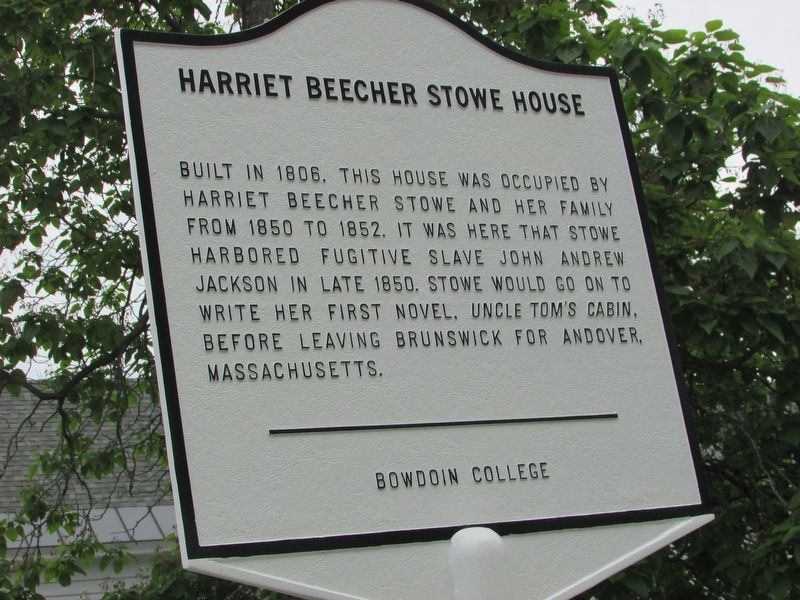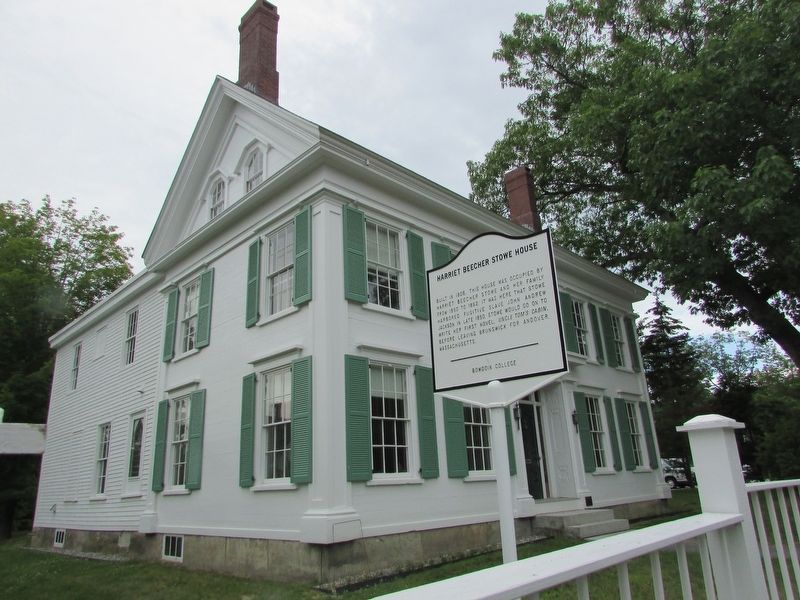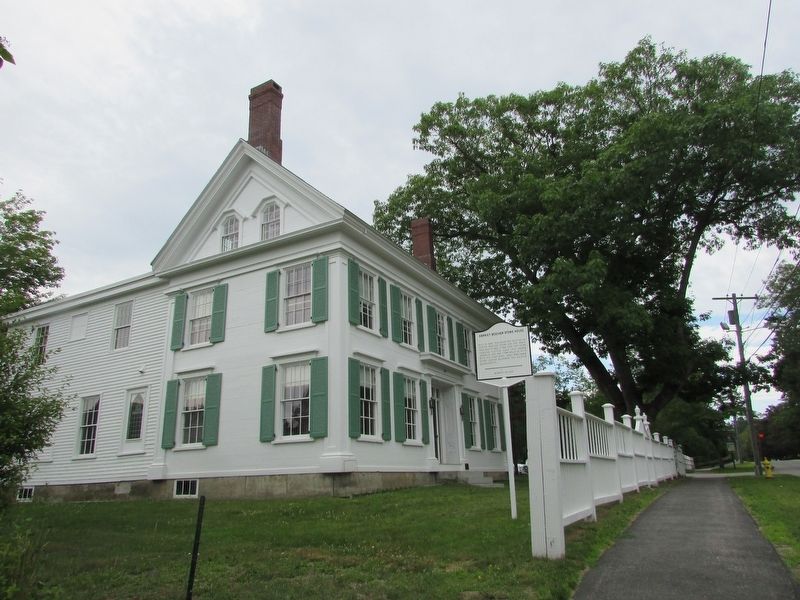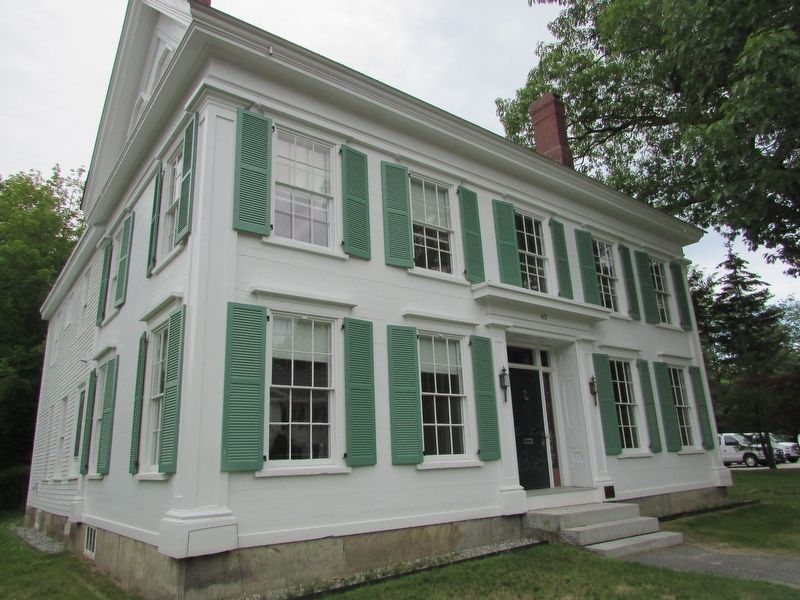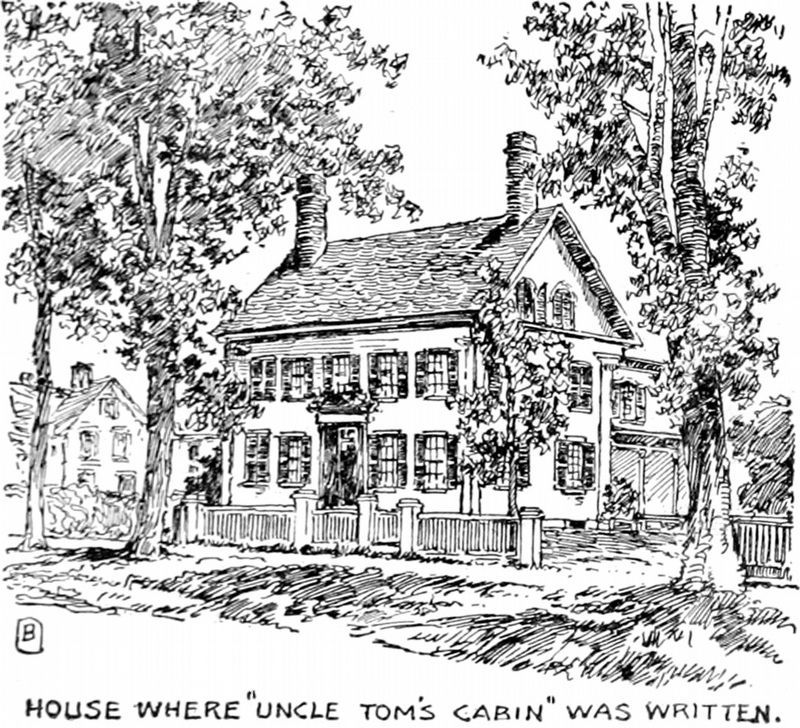Brunswick in Cumberland County, Maine — The American Northeast (New England)
Harriet Beecher Stowe House
Built in 1806, this house was occupied by Harriet Beecher Stowe and her family from 1850 to 1852. It was here that Stowe harbored fugitive slave John Andrew Jackson in late 1850. Stowe would go on to write her first novel, Uncle Tom’s Cabin, before leaving Brunswick for Andover Massachusetts.
Erected by Bowdoin College.
Topics. This historical marker is listed in these topic lists: Abolition & Underground RR • Arts, Letters, Music • War, US Civil • Women.
Location. 43° 54.778′ N, 69° 57.667′ W. Marker is in Brunswick, Maine, in Cumberland County. Marker is at the intersection of Federal Street and Maple Street, on the right when traveling north on Federal Street. Touch for map. Marker is at or near this postal address: 63 Federal Street, Brunswick ME 04011, United States of America. Touch for directions.
Other nearby markers. At least 8 other markers are within walking distance of this marker. Company K, 1st Maine Volunteer Infantry (approx. 0.2 miles away); Brunswick Veterans Memorial (approx. 0.2 miles away); Founding of the Maine Medical Association (approx. 0.2 miles away); Robinson Memorial Gate (approx. 0.2 miles away); Home of Joshua Lawrence Chamberlain (approx. ¼ mile away); Bowdoin College World War Memorial (approx. 0.4 miles away); Bowdoin College War Memorial (approx. 0.4 miles away); a different marker also named Robinson Memorial Gate (approx. 0.4 miles away). Touch for a list and map of all markers in Brunswick.

Photographed By Allen C. Browne, August 9, 2015
5. Harriet Beecher Stowe
This 1853 portrait by Alanson Fisher hangs in the National Portrait Gallery in Washington, DC.
“Excluded from public professions, cultivated women sought other avenues for their talents. From discussing the issues of the day in informal salon gatherings, it was a short step for women to become writers, especially since the antebellum period saw a burgeoning number of magazines catering to women. So Harriet Beecher Stowe started a career that made her one of the most popular novelists of the nineteenth century. Stowe's place in American history was sealed with her novel Uncle Tom's Cabin (1851-52), which sold 300,000 copies in its first year. Uncle Tom's Cabin was a reform novel; Stowe was motivated to write it by the Fugitive Slave Law and the effect that slavery had in destroying the African American family. No more effective charge could be made in a nation that, both North and South, revered the family as the foundation of society.” -- National Portrait Gallery
“Excluded from public professions, cultivated women sought other avenues for their talents. From discussing the issues of the day in informal salon gatherings, it was a short step for women to become writers, especially since the antebellum period saw a burgeoning number of magazines catering to women. So Harriet Beecher Stowe started a career that made her one of the most popular novelists of the nineteenth century. Stowe's place in American history was sealed with her novel Uncle Tom's Cabin (1851-52), which sold 300,000 copies in its first year. Uncle Tom's Cabin was a reform novel; Stowe was motivated to write it by the Fugitive Slave Law and the effect that slavery had in destroying the African American family. No more effective charge could be made in a nation that, both North and South, revered the family as the foundation of society.” -- National Portrait Gallery
Credits. This page was last revised on July 4, 2018. It was originally submitted on July 10, 2017, by Bill Coughlin of Woodland Park, New Jersey. This page has been viewed 539 times since then and 38 times this year. Photos: 1, 2, 3, 4. submitted on July 10, 2017, by Bill Coughlin of Woodland Park, New Jersey. 5, 6. submitted on July 3, 2018, by Allen C. Browne of Silver Spring, Maryland.
